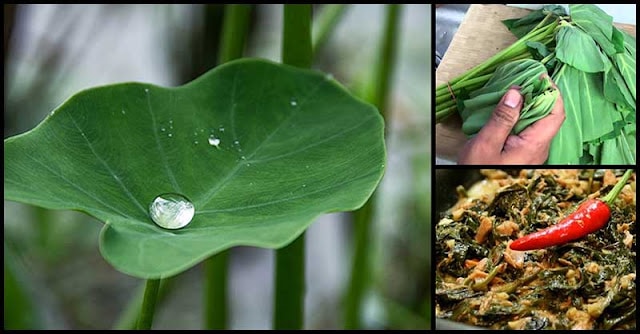The Taro plant is known for its heart-shaped leaves that are served as a staple food in various cuisines. These leaves flourish wherever there are abundant sun and moisture. However, they are classically resistant to water in the sense that the water easily slides off their surfaces without adhering. Consuming cooked taro leaves has been associated with several potential health benefits.
Helps Prevent Anemia
Taro leaves have iron content, a mineral that is needed in red blood cell formation. Additionally, they also have vitamin C which helps in absorbing the iron well. Consumption of taro leaves will help our body meet the need for red blood cells.
Helps In Losing Weight
Taro leaves are a nutritious and versatile ingredient that can fit well into any diet. They are an excellent food to help promote a healthy body weight as they are low in carb and fat content, a good source of fiber (1-cup (145-gram) serving of cooked leaves provides 3 grams), and have high water content. Due to these, the leaves may help aid weight management by promoting feelings of fullness with meals, causing a person to eat less.
Helps Reduce Wrinkly Skin
Taro leaves contain threonine, an amino acid that aids the formation of elastin and collagen which are good for healthy skin. Moreover, it is also loaded with vitamin A and C. Vitamin A reduces the impact of the sun’s rays on the skin while vitamin C has an integral role in collagen synthesis. With regular consumption, the leaves will help rejuvenate the skin and prevent it from wrinkling.
Supports Liver Function
Taro leaves support detoxification by promoting the removal of heavy metals in the body. Usually, these heavy metals are difficult to remove as they become sequestered in fats and stay there for years – having negative effects on our health. Taro leaves helps in getting rid of these toxins.
Helps Boost Heart Health
When added as part of an overall nutritious diet, taro leaves may help promote heart health. According to studies, they contain good amounts of dietary nitrates which help to promote healthy blood pressure. Aside from this, they are also low in calories, high in fiber, and high in micronutrients which contributes to several potential health benefits, such as boosting heart health and preventing disease.
Supports Healthy Pregnancy
Being a good source of dietary folate, consumption of the leaves can help ensure the health of the unborn child. Sufficient folate consumption lowers the risk of spina bifida occurring and assists with the healthy development of the neural tube.
Caution
The leaves of the taro plant contain high levels of oxalates that can be poisonous when consumed raw. The oxalate content may cause itching and contribute to the formation of kidney stones.
To deactivate the poisonous oxalates in taro leaves, they must be cooked until they soften which only takes a few minutes when boiling or 30 minutes to an hour when baking.









